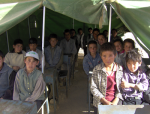Ongoing Projects
![]() Resilience: Conceptualization for Research and Policy
Resilience: Conceptualization for Research and Policy
This work draws together work from academia and humanitarian practice and policy, to help define and operationalize resilience.
See policy brief here and abstract here
Child and Youth Resilience Scale
We developed and validated the Arabic-language Child and Youth Resilience Measured (CYRM), and are currently implementing the measure with Syrian refugee and Jordanian youth. More information here: https://pubmed.ncbi.nlm.nih.gov/28617937/.
![Childlren in a tent]() Resilience and Mental Health in Afghanistan
Resilience and Mental Health in Afghanistan
Mark Eggerman and Catherine Panter-Brick have conducted the first longitudinal survey of child and adolescent mental health in Afghanistan – a project designed to integrate cross-cultural psychiatric epidemiology with medical anthropology. With analysis of longitudinal data, they provide evidence for the cluster of adversities that impact family wellbeing and the mental health cascade across generations. They also identify the culturally-meaningful leverage points for building family-level resilience, relevant to the prevention and intervention agenda in global mental health.
More information here: https://pubmed.ncbi.nlm.nih.gov/25384553/
https://pubmed.ncbi.nlm.nih.gov/24286507/
https://pubmed.ncbi.nlm.nih.gov/21421175/
https://pubmed.ncbi.nlm.nih.gov/19699514/
https://pubmed.ncbi.nlm.nih.gov/18663740/
![Young boy]() An Ethnographic Study of Father-Child Interactions & Child Development in Sierra Leone
An Ethnographic Study of Father-Child Interactions & Child Development in Sierra Leone
This study, led by Kristen McLean, provides much-needed data on how men raise their children in the aftermath of conflict, and the impact of father engagement on family dynamics and child wellbeing. The study is embedded within the research program directed by Professor Theresa Betancourt on the intergenerational impact of war in Sierra Leone. For the Harvard program, please see: https://fxb.harvard.edu/former-programs/
![woman getting blood pressure]() Mental health, psychosocial distress, and stress biomarkers
Mental health, psychosocial distress, and stress biomarkers
Amelia Sancilio, Mark Eggerman, Andrew Rasmussen, Peter Ventevogel, and Catherine Panter-Brick have evaluated measures of wellbeing in Afghanistan, to compare the extent to which screening for poor mental health (using a standard WHO scale) maps onto psychosocial distress (using a culturally-specific scale) and physiological stress (blood pressure).
More information here: https://pubmed.ncbi.nlm.nih.gov/27435220/
 Resilience: Conceptualization for Research and Policy
Resilience: Conceptualization for Research and Policy

 An Ethnographic Study of Father-Child Interactions & Child Development in Sierra Leone
An Ethnographic Study of Father-Child Interactions & Child Development in Sierra Leone 